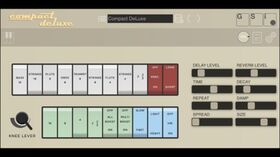Compact DeLuxe |
| この情報はストアのものより古い可能性がございます。 | ||||
| 価格 | 2500円 | ダウンロード |
||
|---|---|---|---|---|
| ジャンル | ミュージック | |||
サイズ | 6.7MB | |||
| 開発者 | Genuine Soundware | |||
| 順位 |
| |||
| リリース日 | 2023-03-10 17:00:00 | 評価 |
|
|
| 互換性 | iOS 9.3以降が必要です。 iPhone、iPad および iPod touch 対応。 | |||
Please note: This App comes with an AUv3 plugin extension.
GSi Compact DeLuxe is a component modeling emulation of a Farfisa Compact DeLuxe.
INSTRUMENT BACKGROUND
Among the many transistor organs of the past, also known as "Combo Organs" (mostly because some of them also had a rhythm section and built-in speakers), the Farfisa Compact DeLuxe, along with its big brother the Compact Duo, was one of the most used organs at least in the european beat scene of the early and mid seventies. The electronic circuit of this kind of organ is relatively simple, at least on paper: rather than using a mechanical tone generator like the tonewheel models (Hammond and Pari), the transistor organs used a circuit called "Top Octave Synthesizer", TOS for short, responsible of the generation of 12 waveforms, one for each note of the last octave of the organ keyboard. The basic waveform was usually something halfway between a ramp and a triangular. The lower octaves were produced by means of "divider" circuits that could halve the frequency of each waveform, going so forth for each lower octave down to the pedalboard tones. At each division, something was lost and something was gained in terms of harmonic content. The result was that the same notes of different octaves had oscillators perfectly in sync, so all C notes were in sync, all C#, all D and so on. This same technique was also used in so-called "string machines" or "stringer keyboards" that emulated orchestral sounds (violins, trumpets, etc.) - see GSi's Electrorchestra.
The various registers in combo organs were produced by passing the raw waveforms through a filter bank, so some waveforms were low-pass filtered for bass-like sounds, some were high-pass filtered for violin-like sounds, etc. and some waveforms also went through more than one filter. This also adds some level of phase shifting between waveforms coming from different registers, the reason why the sum between, e.g. a Flute 8' and a Violin 8' isn't exactly the superimposition of the two waveforms, but something slightly different. And this is one of those underrated details that made the sound of some Combo Organs pretty unique.
The sound engine of GSi Compact DeLuxe is also included in the GSi Gemini as well as in the Crumar Mojo 61.
Of course this type of instrument gives its best if run through external effects and amps. Have a look at the GSi catalog and experiment with some of the effects offered by GSi.
Main features:
- Component Modeling engine (no samples, all real-time synthesis)
- Full Polyphony (61 notes, 12 Top-Octave Oscillators + Frequency Dividers)
- Key multi-contact simulation with authentic and adjustable key click
- Authentic recreation of the Farfisa register filters
- Recreation of the background noise and leakage
- Adjustable vibrato (speed and depth)
- Built-in Stereo Delay effect
- Built-in Stereo Reverb effect
- Built-in programmer with unlimited Programs
- Embedded user's manual
- Available as Stand-alone application and audio plugin
- Very low CPU and RAM usage
更新履歴
Fixed keyboard layout issue with bigger iPads
Added compatibility with iPhone
GSi Compact DeLuxe is a component modeling emulation of a Farfisa Compact DeLuxe.
INSTRUMENT BACKGROUND
Among the many transistor organs of the past, also known as "Combo Organs" (mostly because some of them also had a rhythm section and built-in speakers), the Farfisa Compact DeLuxe, along with its big brother the Compact Duo, was one of the most used organs at least in the european beat scene of the early and mid seventies. The electronic circuit of this kind of organ is relatively simple, at least on paper: rather than using a mechanical tone generator like the tonewheel models (Hammond and Pari), the transistor organs used a circuit called "Top Octave Synthesizer", TOS for short, responsible of the generation of 12 waveforms, one for each note of the last octave of the organ keyboard. The basic waveform was usually something halfway between a ramp and a triangular. The lower octaves were produced by means of "divider" circuits that could halve the frequency of each waveform, going so forth for each lower octave down to the pedalboard tones. At each division, something was lost and something was gained in terms of harmonic content. The result was that the same notes of different octaves had oscillators perfectly in sync, so all C notes were in sync, all C#, all D and so on. This same technique was also used in so-called "string machines" or "stringer keyboards" that emulated orchestral sounds (violins, trumpets, etc.) - see GSi's Electrorchestra.
The various registers in combo organs were produced by passing the raw waveforms through a filter bank, so some waveforms were low-pass filtered for bass-like sounds, some were high-pass filtered for violin-like sounds, etc. and some waveforms also went through more than one filter. This also adds some level of phase shifting between waveforms coming from different registers, the reason why the sum between, e.g. a Flute 8' and a Violin 8' isn't exactly the superimposition of the two waveforms, but something slightly different. And this is one of those underrated details that made the sound of some Combo Organs pretty unique.
The sound engine of GSi Compact DeLuxe is also included in the GSi Gemini as well as in the Crumar Mojo 61.
Of course this type of instrument gives its best if run through external effects and amps. Have a look at the GSi catalog and experiment with some of the effects offered by GSi.
Main features:
- Component Modeling engine (no samples, all real-time synthesis)
- Full Polyphony (61 notes, 12 Top-Octave Oscillators + Frequency Dividers)
- Key multi-contact simulation with authentic and adjustable key click
- Authentic recreation of the Farfisa register filters
- Recreation of the background noise and leakage
- Adjustable vibrato (speed and depth)
- Built-in Stereo Delay effect
- Built-in Stereo Reverb effect
- Built-in programmer with unlimited Programs
- Embedded user's manual
- Available as Stand-alone application and audio plugin
- Very low CPU and RAM usage
更新履歴
Fixed keyboard layout issue with bigger iPads
Added compatibility with iPhone
ブログパーツ第二弾を公開しました!ホームページでアプリの順位・価格・周辺ランキングをご紹介頂けます。
ブログパーツ第2弾!
アプリの周辺ランキングを表示するブログパーツです。価格・順位共に自動で最新情報に更新されるのでアプリの状態チェックにも最適です。
ランキング圏外の場合でも周辺ランキングの代わりに説明文を表示にするので安心です。
サンプルが気に入りましたら、下に表示されたHTMLタグをそのままページに貼り付けることでご利用頂けます。ただし、一般公開されているページでご使用頂かないと表示されませんのでご注意ください。
幅200px版
幅320px版
Now Loading...

「iPhone & iPad アプリランキング」は、最新かつ詳細なアプリ情報をご紹介しているサイトです。
お探しのアプリに出会えるように様々な切り口でページをご用意しております。
「メニュー」よりぜひアプリ探しにお役立て下さい。
Presents by $$308413110 スマホからのアクセスにはQRコードをご活用ください。 →
Now loading...




 (1人)
(1人)